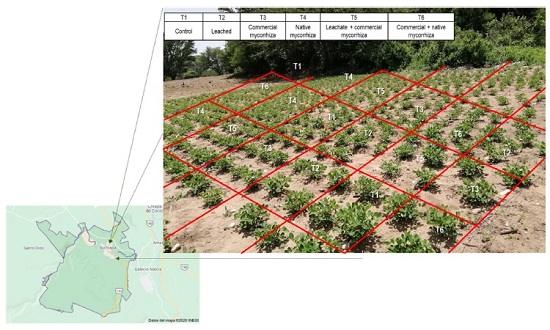Evaluación del efecto de hongos micorrízicos arbusculares nativos y lixiviados de vermicompost sobre el rendimiento y la calidad de cacahuate cultivado en campo
DOI:
https://doi.org/10.28940/terra.v40i0.1612Palabras clave:
Arachis hypogaea, hongos micorrízicos arbusculares, rendimiento de cultivo, calidad de las semillas de cacahuate, lixiviados de vermicompostaResumen
La mejora de la simbiosis generada por hongos micorrízicos arbusculares (HMA) contra microorganismos patógenos han sido descritos, sin embargo el efecto de los HMA en cultivos de cacahuate es de interés por el valor de la cadena productiva que no ha sido atendida en su totalidad, por lo que el presente trabajo de investigación evaluó seis tratamientos: (T1) Plantas testigo sin HMA, (T2) Plantas con lixiviado de lombricomposta, (T3) Plantas inoculadas con micorrizas comerciales, (T4) Plantas inoculadas con micorrizas nativas, (T5) Plantas inoculadas con micorrizas comerciales + lixiviado y (T6) Plantas inoculadas con micorrizas comerciales + micorrizas nativas; en este sentido, se aislaron los hongos micorrízicos, identif icándose Rhizoglomus clarum, Acaulospora alpina y Acaulospora af f. bireticulata, e inoculados en plantas de cacahuate en una superf icie de 144 m2 a cielo abierto, de manera que, para corroborar la incidencia de los tratamientos evaluados, variables agronómicas como la altura, ancho de biomasa, daño foliar por Cercospora personata, número de f lores, fueron evaluadas durante la precosecha cada 15 días y las variables postcosecha fueron; índice de área foliar, longitud de raíces, rendimiento de frutos y lípidos, así como el perf il de ácidos grasos presentes en el fruto. Finalmente, se evaluó la calidad del cacahuate según el CODEX STAN 200-1995, demostrando que el mejor tratamiento fue lixiviado + micorriza comercial, reportando rendimientos de 65.05% de frutos y 58% de lípidos totales, en su mayoría de ácidos grasos monoinsaturados (52% ácido oleico) seguido de poliinsaturados (21% ácido linoleico), f inalmente de acuerdo al CODEX STAN 200-199 los cacahuates obtenidos corresponden a la calidad básica con dimensiones de 4 a 4.5 cm de ancho y largo respectivamente, estos cacahuates no pueden ser exportados pero si pueden ser comercializados en el país con destino a la transformación agroindustrial, permitiendo mejorar prácticas agrícolas al reducir el uso de agroquímicos.
Descargas
Publication Facts
Reviewer profiles N/D
Author statements
- Academic society
- Terra Latinoamericana

















